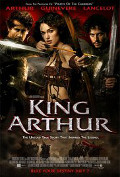
Directed by
Antoine Fuqua
130 minutes
Rated M
Reviewed by
Sharon Hurst

King Arthur
Synopsis: The timeless tale of King Arthur gets a different spin in this version which purports to be based on "archaeological evidence", and sets Arthur in a far earlier than usual time frame of around 400 AD, when the Romans held sway in Britain. Arthur (Clive Owen) is a half-British, half-Roman soldier, Lucius Artorius Castus, leading his trusty knights and an army of painted Woads in a history-defining battle against the savage Saxons, and uniting the Britons under his leadership.I'm a sucker for Arthurian tales and this one had me totally enthralled, even though it is quite a departure from the usual format. Gone is the love triangle of Arthur, Guinevere and Lancelot; in fact Guinevere (Keira Knightley) is depicted here as an independent Woad warrior woman, very adept in battle and with just as much feistiness as feminine wiles.
Clive Owens is handsome and brooding as Arthur, and far more down to earth than the Arthur of many previous films, the director, Antoine Fuqua, wanting to show what he imagined as the real man behind the legend. Although not an overtly charismatic Arthur, I liked Owen's interpretation of the feudal king, a more ordinary individual torn between his desire to return to Rome and the recognition of the need to find a purpose in all the bloodshed of which he's been a part. That he is an ordinary, unassuming man inspiring loyalty and achieving greatness makes him more accessible.
His rag-tag crew are terrific with Ioan Gruffudd as Lancelot, Ray Winstone as Bors, Hugh Dancy as Galahad, Australia's own Joel Edgerton as Gawain, and Mads Mikkelsen as Tristan. Of especial note is Stellan Skarsgard as the fearsome and ruthless Saxon leader, Cerdic. The Merlin of this version is no wizard but rather a Woad who has observed Arthur and tagged him for greatness.
The realistic look of the film is a also pleasant change from the endless computer-generated imagery of recent big battle films. With screenwriter David Franzoni (Gladiator) there's plenty of authenticity to the Romans whilst production decisions like building a life-size replica of Hadrian's wall and complete peasant villages also add to a sense of reality. But it is the fabulous battle scenes that really stand out - all shot over 5 weeks with cameras placed strategically amidst the fray (even on shields and on horses), and giving the audience a visceral sense of being in the thick of the carnage. One particular scene of a fight staged on a frozen lake is most memorable, with some impressive underwater shots.
The film blends an epic feel, backed by Hans Zimmer's excellent score, with many moments of simple humanity that truly moved me. In a strife-torn world I find myself wanting to believe ordinary people's rise to greatness could change things for the better and so this revisiting of the King Arthur legend is ultimately an uplifting experience.

Want more about this film?


Want something different?




